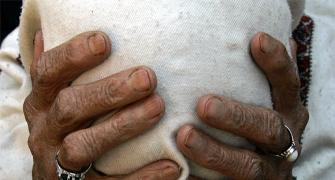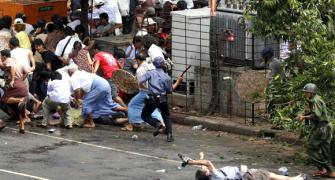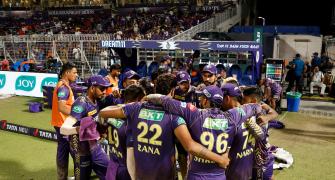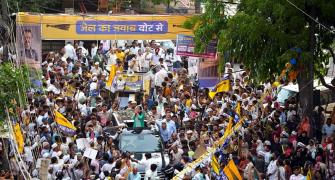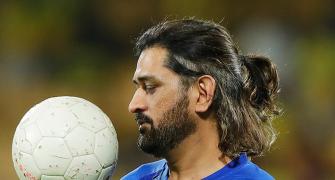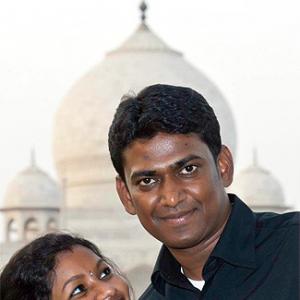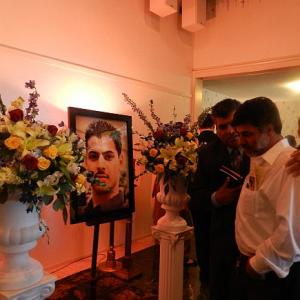Speaking in the state assembly in Chennai on Tuesday, April 24, Tamil Nadu Chief Minister J Jayalalitha declared that the state police is not a 'trigger happy' force.
She said the February 23 encounter in which five suspected bank robbers were killed in Chennai was necessitated only after they opened fire on police personnel, forcing them to retaliate.
PTI reported that Jayalalitha told the House that a police team had reached the site on information that the robbers were holed up in a house and asked them to come out.
'Police told the robbers in Tamil and Hindi to come out of the house, but the latter not only declined to do so, but also opened fire,' she said.
The police, she added, had retaliated with a view to protect themselves and the public (as it was a residential area) and added that the five men were declared brought dead to hospital.
Madhumita Dutta, the Chennai-based social and environmental activist, says, "What happened that day at Velachery (the area where the encounter occurred) disturbed not only me, but many people."
Dutta criticised the state administration when the Tamil Nadu police issued instructions to colleges to furnish details of non-Tamil students, sought details of non-Tamil tenants and also started enumeration of migrant workers in the state.
In this interview to Rediff.com's Shobha Warrier, Dutta explains how racial profiling affects India's fabric.
As a social activist, how do you look at the midnight encounter deaths of four young men from Bihar and one from West Bengal at Velachery in February, alleging that they were behind a bank robbery?
Not only as an activist, as a citizen, I would like to know what is going on.
What happened that day at Velachery disturbed not only me, but many people.
There are two things that worried us. One is the complete secrecy and insidious way in which the State, the police and the administration tried to catch the bank robbers. It seems they were under pressure to crack the bank robbery.
It ended with the police killing five men in cold blood in the middle of the night. They went to the house in the name of taking them to the station. For police verification, why do you have to send armed policemen at midnight?
When we went and met the police commissioner as a part of a fact-finding team, he basically did not deny the fact that they were not sure of the identity of the men in the flat.
He also said they were not even sure whether the person in a red shirt whom they saw on the CCTV of the robbery was the same person inside. So when they sent 14 armed men, ready to kill in the middle of the night. They had absolutely no clue who were the men inside. Then, they killed all five of them.
We went to a similar flat and we found that it was not necessary to have so much violence to take out five men. It was a small flat, less than 600 square feet with just one door to go out.
As an activist, I am deeply concerned about another thing. The encounter happened on February 23, but on January 24, even before the encounter happened, there was a law and order meeting chaired by the state's principal secretary where it was discussed that the robbery was carried out by north Indians because someone heard them conversing in Hindi!
Therefore, they said the police should collect all information about all migrant workers and also asked colleges to furnish details of all north Indian students.
Now, this is even before the encounter. So they built a case against north Indians!
So you see it not as another encounter death, but targeting a certain race of Indians?
It is certainly targeting a certain section of people on the lines of ethnic and linguistic lines. Yes, it is basically profiling.
In January, three teenagers who were farm workers in Pollachi were lynched and one of them died. They were also called north Indian thieves.
On February 26, there was one more lynching in the heart of Chennai where a person from Andhra Pradesh was taken to be a north Indian.
The kind of police menacing that started post the encounter on migrant workers was targeted at a particular class of people. The way they are targeting non-Tamil students and tenants is like invasion of your privacy.
Do you call this a violation of basic human rights?
Yes. You give all details to your college during admission. Why does the college have to share your private details with somebody just because you heard some bank robbers conversing in Hindi?
It is like you are looking at every person speaking in Hindi to be a bank robber.
Has the administration started implementing this order in colleges?
Yes, of course. It is happening in all colleges. The police have been posted in many private colleges and hostels.
If you are not from Tamil Nadu, every other day, you are stopped and asked questions. But these students won't talk to you about this; they are scared.
Do you think this is against the Constitutional rights of all individuals?
Our Constitution does not allow discrimination against or targeting based on our ethnicity, language or race.
This is what we saw in Maharashtra. This is exactly how the Maharashtra Navnirman Sena targeted workers from Bihar in Mumbai.
Is there a difference between a political party doing it and a state administration doing it?
Definitely, there is a difference. It was a political party that did this discrimination in Mumbai. The State also discreetly supported it, we feel.
In Tamil Nadu, the administration itself is targeting people.
Do you feel this kind of racial profiling is happening only in Tamil Nadu, or does it exist in other places too?
I have not seen this kind of profiling anywhere else. I know that in Mumbai and Delhi, all the tenants, irrespective of where they are from, have to register at a police station as part of the rules. But here, only north Indians are targeted.
It is like, all crimes are done by north Indians and it is difficult to track them, so get their details. This sort of profiling, I have not seen anywhere.
Do you feel people living here have the same perception?
If the common man has that perception, I blame the media for it. The media gave the perception that all north Indians are criminals. So, a common man gets that image.
They have no idea who a north Indian is because the police asked me, whether I was a north Indian.
I said depends on how you look at it. If I am standing north of you, I am a north Indian. I am a Bengali, but to them, I am a north Indian.
You spoke about what the MNS did to Bihari workers in Mumbai. That issue got a lot of national attention.
Why do you think what has happened in Tamil Nadu has not become national news?
When this sort of a thing happened in Mumbai, a lot of political parties, intellectuals, activists, took up the issue. There was a lot of criticism from all quarters.
In the 1960s and 1970s, they had targeted even the Tamils in Mumbai.
But in Chennai, except for a few intellectuals, nobody really came out and spoke. No political party, no mass movements, no trade unions, nobody came out.
Even the voices of human rights activists were not heard....
You are right. It was bizarre. I was raising the issue, but at the end of the day, I was also bracketed as a north Indian and not a human rights activist.
I wrote an op-ed in The Hindu and the article received 77 comments, but most of them were against me, a 'north Indian' who wrote the piece.
I felt it took a so-called north Indian to write such an article and not someone from Tamil Nadu.
Do you feel the public supports what the administration is doing?
The middle class supports the State in whatever they do. They are only interested in their safety.
There may be north Indian middle and upper class (people) who may say the migrant workers are criminals. That way, they are all united.
Who is responsible for creating an image that all poor migrant workers are criminals?
The State, the police and the media. Whatever the police feeds, the media reports exactly without being objective about it.
Even among the working class, the perception is the same. The local workers feel that their work is being taken away by migrant workers. So, there is a kind of feeling against migrant workers among the working class. That is the not the ground reality.
What about the trade unions? What was their stand?
What has surprised me is the non-participation of the trade unions. To them, it should not matter whether the worker is from Tamil Nadu or Bihar. If the rights of the workers are getting violated, the unions should intervene.
We had called all the unions for a meeting and they promised us that they would send a joint memorandum to the police, but till now, it has not happened. A month-and-a-half has passed.
I had spoken to the general secretary, CITU (Centre of Indian Trade Unions). He came to the press conference and said whatever has happened was wrong. But as a trade union, you should take it at a political level.
What is the idea of an Indian then? It is said we can go anywhere in India and work...
The idea of an Indian is only for some sections and some classes, but for the large section, it is a different kind of life. In their everyday life, as far as rights and entitlements are concerned, none of them have the rights of an Indian.
If you cannot go anywhere in India and work, what is Indian about it?
The Criminal Tribes Act of British vintage was repealed in independent India in 1949 and the so-called criminal tribes denotified in 1952. Do you feel we see a similar kind of bias today?
Yes, there is a general bias the State has to a certain section of the people, the poor and the working class. Imagine we still have Section 121, waging war against the State and sedition which the British brought to curb political movements. We are using it against our own people.
There are allegations of racial profiling by the US after 9/11. Do you feel a similar trend is emerging in India too?
People from the north-east were targeted in Delhi when Chinese President Hu Jintao visited earlier this month.
The scales might be different, but the mindset is the same everywhere.

